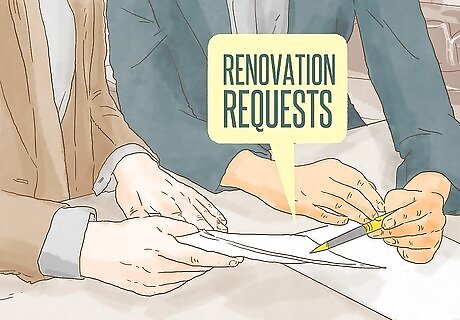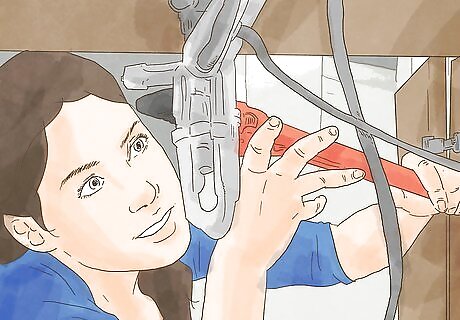
views
Getting Your Landlord to Pay for Necessary Renovations

Read your lease. Make sure that you understand all the responsibilities of your landlord and those of the tenant (you). In particular, read thoroughly any sections concerning repairs, maintenance, or damages. If your apartment is in need of repairs in order to bring it up to acceptable living conditions, laws generally state that it is your landlord’s responsibility to take care of those repairs. Typically, leases require landlords to ensure that properties remain livable, which means things like: Meeting building codes Keeping the building clean and free from damage Keeping the building safe from intruders (all windows and doors function properly, for example) Ensuring protection from the weather (no leaks, drafts, etc.)

Make a list of any unreasonable living conditions. According to typical housing laws, landlords are required to ensure that the condition of their rental properties meet basic standards. For instance, if you have leaks, mold, broken windows, or other substandard conditions in your apartment, your landlord should take care of the repairs in a reasonable amount of time, and at no cost to you. Remember that most landlords are willing to pay for necessary repairs if you inform them that they need to be done. The rental properties are investments for landlords, and they want to ensure that the properties stay in good condition and continue to provide returns. Generally, there are special laws regarding renovations necessary to remove hazardous materials such as lead and asbestos. Your landlord should disclose if any of these materials are present, and you can ask about renovations to remove them.

Take pictures of areas that require repairs. Before asking for necessary renovations, take pictures of any damaged or substandard areas of your apartment. Make at least two sets of these pictures, and mail one set to your landlord, if necessary. This will provide proof of the necessary renovations, should you need it.

Put the request for repairs in writing. Type, save, and print a list of necessary renovations, so that there will be a record of the request. If you have to mail the request to your landlord, use certified mail so that you can verify receipt. Make sure to include copies of the pictures you took when giving your landlord a copy of your request. Keep a record of all additional communication with your landlord as well.

Take further action if necessary. When asking your landlord to take care of necessary renovations, keep communication polite and professional. More than likely, your landlord will respond in kind. However, if your landlord does not respond to your request, refuses to make necessary repairs, or makes unreasonable delays in doing so, you can take further action. Depending upon the area in which you live, you may be able to: File a complaint with a local official, such as a housing, fire, energy, or health inspector. Ask a court to hold your rent in escrow, and to order the landlord to make the repairs. Sue the landlord under any applicable laws. Consult an attorney for legal advice if you think you need to take legal action against your landlord. Even if your landlord delays in making the necessary repairs, you should still pay your rent on time and following any housing rules, because if you do not, you may violate your lease.
Convincing Your Landlord to Pay for Cosmetic Renovations

Be an exceptional tenant. You can establish good relations with your landlord by paying your rent on time, following any housing rules, and keeping your apartment in good condition. These good relations can help you convince your landlord to agree to renovations. Remind your landlord that you’ve been a good tenant when asking about renovations.

Read your lease. Make sure you understand what kinds of renovations are allowed by your lease agreement. In most cases, landlords are not required by the terms of a lease to make cosmetic (non-necessary) renovations. If you want these done, you will have to negotiate. Cosmetic renovations include things like: Painting walls simply to change the color (and not because of damage or age) Replacing functioning lighting fixtures with new ones Removing or adding walls to change the apartment layout Replacing non-damaged countertops for stylistic reasons

Have renovation requests built into your lease if at possible. If you know before moving in or signing a new lease that you would like renovations done, try to have your landlord agree to these before you sign the lease. Have the renovation requests be written into the lease or as an addendum to it. Make sure that the lease includes all the information, including when the renovations will be completed, and how they will be paid for (“XYZ renovations will be completed at the landlord’s expense by [insert date]…”).

Decide what you want to be done. Many landlords might be convinced to do reasonable renovations. Perhaps you can’t expect them to approve a complete kitchen makeover, but you might get them to agree to new cabinets or a fresh coat of paint. Try to convince your landlord that the upgrades would make the apartment attractive not only to you, but to future renters. For instance, a landlord might not want to replace carpeted floors with hardwood, because a future tenant might not like them. You might be more successful asking for a new or better stove, however, because this is a standard feature that could benefit from an upgrade. Remember that landlords may simply not agree to certain renovations.

Offer to research renovations. You can offer to find a suitable contractor to do the renovations, and to get an estimate of the renovation costs from the contractor. Your landlord might appreciate not having to take the time to do this research, and therefore be more willing to agree to the renovations.

Research tax credits, value increases, other incentives. In some cases, landlords may be able to get a tax benefit from renovating their properties. Likewise, renovations might help the value of their properties rise. Remind your landlord of these incentives, as they might help convince your landlord to agree to the renovations.

Consider doing and/or paying for the renovations yourself. If you are capable of doing some renovations yourself, offer to do so. Your landlord might be convinced if you offer to pay for the materials and provide the labor. Even if you plan to pay for the renovations yourself, however, you should always ask your landlord before making any major renovations, including painting walls, replacing appliances, etc. If you do not have permission from your landlord to make these changes you might be violating your lease.

Offer to enter into a long lease. Asking your landlord to pay for renovations might take some negotiating. You can give them something in return if you offer to sign a longer lease. By committing to staying in the apartment longer, you let your landlord know that the renovations will be worth it.

Make sure you and your landlord understand how the renovations will be paid for. Whether you are doing the renovations yourself, or hiring a contractor, you and your landlord need to agree on how the work will be paid for. If you are doing the renovations yourself, know whether or not the landlord will pay you for the cost of materials. If they will pay for them, specify when and how. If a contractor is hired to do the renovations, know if the landlord will pay the contractor directly, or if will you pay and then be reimbursed by your landlord. It will be easiest for you if your landlord can pay the contractor directly.

Accept a possible rent increase. In some cases, a landlord will agree to cosmetic renovations, but only if the apartment’s rent goes up. This ensures that the apartment continues to be profitable. If you are happy with your apartment, and really want to have specific renovations done, then you may need to accept a reasonable increase in rent. In many cases, you can negotiate rent increases with your landlord.

Get the final agreement in writing. Make sure that there is a written version of the final agreement concerning the renovations. This written agreement should include information such as: Exactly what renovations will be completed When the renovations will begin, and when they are expected to end Who will pay for the renovations, and how




















Comments
0 comment